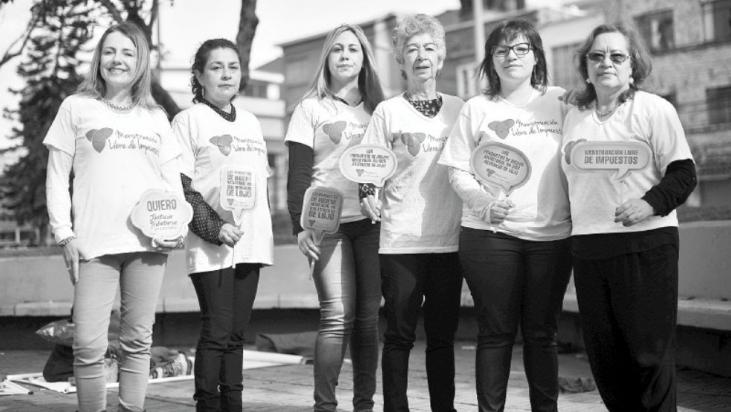Example for Latin America, the campaign organized by Colombian women achieved the elimination of VAT on sanitary pads and tampons.
By Daniela Mora Saavedra.
Women and girls have their menstrual cycle every month. It is a physiological, healthy and natural function, which is part of a vital cycle that starts when they are between 10 and 15 years old, and ends approximately between their 45 and 55 years of age. Each cycle can last five days on average. It is a part of the human condition that has a direct impact on sexual and reproductive rights and is also a multidimensional phenomenon, since it interferes in our economical, social, political and cultural experience and, therefore, in our life quality.
In Colombia, besides being treated as a taboo and having an approach that ignores the need to address menstruation beyond “pain” or “private care” towards a public health issue, menstruation and menstrual rights were relegated to the disposition of the market that burdened women with very expensive products, and under policies that promote sexist taxes.
Furthermore, given that in Colombia the generation of wealth and its distribution have not been adequate, the different governments have implemented a new tax reform approximately every two years: in 2020 the country has gone through 14 reforms in less than three decades. The reforms focused on taxing work instead of capital through indirect taxes such as the Valued-Added Tax, which currently represents 27.6% of tax collection and charged menstrual hygiene products as if these were “luxury or cosmetic” goods.
When we think about the economic progress of women in Colombia and how to achieve it, the first thing that stands out is the need to take categorical actions so that gender equality is not a slogan but a reality. In 2015, the Gender and Economic Justice group* was created within the Red de Justicia Tributaria in Colombia, an initiative of academic women, students, activists, workers, among others, to carry out research, advocacy, proposals and mobilization on issues related to gender equality in the field of economic and tax policies in the country.
In 2016, after a research on the reality of menstruation in Colombia, the group found worrying results. On average, the menstruation cycle of women (40 years in monthly cycles of 28 days, of which five are bleeding) requires 25 pads or tampons monthly, 300 annually and 12,000 throughout life. Considering that in Colombia, in 2016, there were 13,295,845 girls and women between 10 and 44 years old, this population segment would have to pay on average $ 95,000 (Colombian Pesos) annually for sanitary pads and/or tampons. Annually, it would be a total expense of $ 1.26 trillion, and an amount of $ 202,097 million of women’s contribution through VAT.
Here are some key conclusions of this study:
- The VAT on sanitary pads and tampons violates the principle of equity, given it specifically affects women, who are less able to bear the tax due to their limited access to economic resources.
- It affects a vital aspect for women: we can not avoid buying these products.
- The Colombian tax system discriminates against women, who bear a higher tax burden due to an essential characteristic of their gender.
- Sanitary pads and tampons are not luxury items.
The campaign Menstruación Libre de Impuestos (Tax-Free Menstruation) consisted of the joint effort of organizations and individuals who, through advocacy, communication and research activities, fought the discrimination against women and demonstrated that tax and economic policies are not gender-neutral.
During the tax reform debate in 2016, the group prepared a legislative proposal to exempt these products from VAT. The Congress denied the full exemption, but agreed to lower it from 16% to 5%.
Later, in 2017, a lawsuit was filed requesting the Constitutional Court to declare the unconstitutionality of VAT on menstrual hygiene products. Finally, in 2018, the Court resumed the discussion and ordered the elimination of VAT on sanitary pads and tampons.
In 2019, the group launched a book about the campaign to motivate and strengthen other initiatives for gender equality, allowing women and men to go the extra mile towards a successful experience. It is a tribute to the joint effort of all. Supported by OXFAM Colombia and directed by Cedetrabajo, the publication was exclusively designed by women with El Lado X de la Publicidad, honoring the idea that we are proud of “creating and thinking like girls”.
Both the campaign and the book are the synthesis of the collective effort to find another model of society in this unequal country and, above all, to show to the population that it is legitimate to fight for their economic and social rights — in this case, against tax injustice.
We have already achieved a tax-free period but there is still a long road ahead: we must urge the government to make the price reduction effective and to continue advocating for other initiatives that allow us to win other battles against discrimination, not only in Colombia, but in Latin America.
Daniela Mora Saavedra is a political scientist specialized in public finance. She is responsible for gender affairs and projects coordination at Cedetrabajo in Colombia.
* The Centro de Estudios del Trabajo (Cedetrabajo) was the organization that served as facilitator for the articulation of the tax-free menstruation campaign through the Gender and Economic Justice group, with the support of OXFAM. This group was made up of: Luz América Díaz, Luz María Correal, Adriana Cadena, Clara Viviana Plazas, Rosalba Castiblanco, Laura Rangel, Ana Julieta Barbosa, María Cristina Umbarila, María Eugenia Villamizar, Karola Enríquez, Natalia Moreno including the creatives behind the logo and the communication campaign, especially Karen Reyes.
